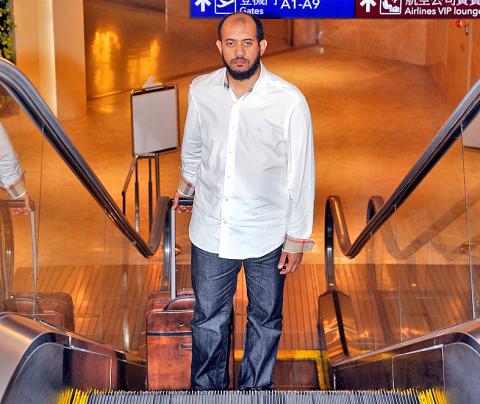A man from the United Arab Emirates whose name is on a US list of possible terror suspects was deported from Taiwan after arriving at Kaohsiung International Airport on a flight from Shanghai, officials said yesterday.
The man, identified as Baghlaf Saeed Ahmed, arrived in Greater Kaohsiung on Wednesday, and immigration officials found his name on a US watch list, the National Immigration Agency (NIA) said.
Ahmed was then escorted to Taiwan Taoyuan International Airport for a late-night flight to Dubai because there are no flights to Dubai from Kaohsiung, said Chien Chuan-kang (錢傳綱), head of the Aviation Police Bureau’s Kaohsiung branch.

Photo: Chu Pei-hsiung, Taipei Times
Ahmed said he wanted to visit Taiwan on business, but the authorities decided on immediate deportation out of concern for border security, the agency said, adding that it had notified international counterterrorist organizations of his arrival.
The agency said an accord the government signed in 2011 on the mutual exchange of terrorist information gave Taiwan access to the US databases on terror suspects.
The accord on tightening immigration controls against felons and terrorists was signed in December 2011 as part of Taiwan’s efforts to gain entry to the US’ visa-waiver program.
While the agency identified the US database it uses as the Remote Query International (RQI) database, which it said had more than 6,000 items of information, it is not clear if it is referring to the Terrorist Identities Datamart Environment, a database on known or suspected terrorists that is maintained by the US National Counterterrorism Center, or the Terrorist Screening Database, which is maintained by the FBI’s Terrorist Screening Center.
However, the NIA said that the government has forwarded information to the US Terrorist Screening Center via the American Institute in Taiwan three times since the 2011 accord was signed.
It said Taiwan uses the list provided by the “RQI database” with the Advance Passenger Information System (APIS) established by the US Customs and Border Protection since last year for more comprehensive screening.
APIS provides pre-arrival and departure manifest data on all passengers and crew members.
All travelers coming to, leaving or transiting through Taiwan’s airports or ports are checked against the APIS system, the agency said.
Additional reporting by staff writer

US President Donald Trump yesterday announced sweeping "reciprocal tariffs" on US trading partners, including a 32 percent tax on goods from Taiwan that is set to take effect on Wednesday. At a Rose Garden event, Trump declared a 10 percent baseline tax on imports from all countries, with the White House saying it would take effect on Saturday. Countries with larger trade surpluses with the US would face higher duties beginning on Wednesday, including Taiwan (32 percent), China (34 percent), Japan (24 percent), South Korea (25 percent), Vietnam (46 percent) and Thailand (36 percent). Canada and Mexico, the two largest US trading

AIR SUPPORT: The Ministry of National Defense thanked the US for the delivery, adding that it was an indicator of the White House’s commitment to the Taiwan Relations Act Deputy Minister of National Defense Po Horng-huei (柏鴻輝) and Representative to the US Alexander Yui on Friday attended a delivery ceremony for the first of Taiwan’s long-awaited 66 F-16C/D Block 70 jets at a Lockheed Martin Corp factory in Greenville, South Carolina. “We are so proud to be the global home of the F-16 and to support Taiwan’s air defense capabilities,” US Representative William Timmons wrote on X, alongside a photograph of Taiwanese and US officials at the event. The F-16C/D Block 70 jets Taiwan ordered have the same capabilities as aircraft that had been upgraded to F-16Vs. The batch of Lockheed Martin

GRIDLOCK: The National Fire Agency’s Special Search and Rescue team is on standby to travel to the countries to help out with the rescue effort A powerful earthquake rocked Myanmar and neighboring Thailand yesterday, killing at least three people in Bangkok and burying dozens when a high-rise building under construction collapsed. Footage shared on social media from Myanmar’s second-largest city showed widespread destruction, raising fears that many were trapped under the rubble or killed. The magnitude 7.7 earthquake, with an epicenter near Mandalay in Myanmar, struck at midday and was followed by a strong magnitude 6.4 aftershock. The extent of death, injury and destruction — especially in Myanmar, which is embroiled in a civil war and where information is tightly controlled at the best of times —

China's military today said it began joint army, navy and rocket force exercises around Taiwan to "serve as a stern warning and powerful deterrent against Taiwanese independence," calling President William Lai (賴清德) a "parasite." The exercises come after Lai called Beijing a "foreign hostile force" last month. More than 10 Chinese military ships approached close to Taiwan's 24 nautical mile (44.4km) contiguous zone this morning and Taiwan sent its own warships to respond, two senior Taiwanese officials said. Taiwan has not yet detected any live fire by the Chinese military so far, one of the officials said. The drills took place after US Secretary